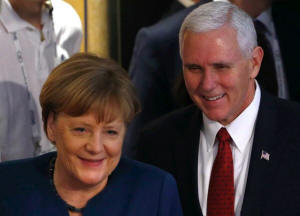|
Pence says U.S. will stand firm with
Europe, NATO
 Send a link to a friend
Send a link to a friend
 [February 18, 2017]
By Roberta Rampton and John Irish [February 18, 2017]
By Roberta Rampton and John Irish
MUNICH (Reuters) - U.S. Vice President Mike
Pence on Saturday brought a message of support for Europe from Donald
Trump but failed to wholly reassure allies worried about the new
president's stance on Russia and the European Union.
In Pence's first major foreign policy address for the Trump
administration, the vice president told European leaders and ministers
that he spoke for Trump when he promised "unwavering" commitment to the
NATO military alliance.
"Today, on behalf of President Trump, I bring you this assurance: the
United States of America strongly supports NATO and will be unwavering
in our commitment to this transatlantic alliance," Pence told the Munich
Security Conference.
While Poland's defense minister praised Pence, many others, including
France's foreign minister and U.S. lawmakers in Munich, remained
skeptical that he had convinced allies that Trump, a former reality TV
star, would stand by Europe.
Trump's contradictory remarks on the value of the North Atlantic Treaty
Organisation, scepticism of the 2015 deal to curb Iran's nuclear
ambitions and an apparent disregard for the future of the European Union
have left Europe fearful for the seven-decade-old U.S. guardianship of
the West.
French Foreign Minister Jean-Marc Ayrault on Twitter expressed his
disappointment that Pence's speech contained "Not a word on the European
Union", although the vice president will take his message to EU
headquarters in Brussels on Monday.

U.S. Senator Chris Murphy, a member of the opposition Democrats, said he
saw two rival governments emerging from the Trump administration.
Pence, Trump's defense secretary Jim Mattis and his foreign minister Rex
Tillerson all delivered messages of reassurance on their debut trip to
Europe.
But events in Washington, including a free-wheeling news conference
Trump gave in which he branded accredited White House reporters
"dishonest people", sowed more confusion.
"Looks like we have two governments," Murphy wrote on Twitter from
Munich. The vice president "just gave speech about shared values between
US and Europe as (the U.S. president) openly wages war on those values."
The resignation of Trump's security adviser Michael Flynn over his
contacts with Russia on the eve of the U.S. charm offensive in Europe
also tarnished the message Pence, Mattis and Tillerson were seeking to
send, officials told Reuters.
U.S. Republican Senator John McCain, a Trump critic, told the conference
on Friday that the new president's team was "in disarray," breaking with
the American front.
The United States is Europe's biggest trading partner, the biggest
foreign investor in the continent and the European Union's partner in
almost all foreign policy, as well as the main promoter of European
unity for more than sixty years.
Pence, citing a trip to Cold War-era West Berlin in his youth, said the
new U.S. government would uphold the post-World War Two order.
"This is President Trump's promise: we will stand with Europe today and
every day, because we are bound together by the same noble ideals –
freedom, democracy, justice and the rule of law," Pence said.
[to top of second column] |

German Chancellor Angela Merkel walks with U.S. Vice President Mike
Pence during the 53rd Munich Security Conference in Munich, Germany,
February 18, 2017. REUTERS/Michaela Rehle

MUTED APPLAUSE
While the audience listened intently, Pence received little applause
beyond the warm reception he received when he declared his support
for NATO.
Ayrault, in a speech defending Franco-German leadership in Europe,
lauded the virtues of multilateralism at a time of rising
nationalism. Trump has promise 'America First.'
"In these difficult conditions, many are attempting to look inward,
but this isolationism makes us more vulnerable. We need the
opposite," Ayrault said.
Pence warned allies they must pay their fair share to support NATO,
noting many lack "a clear or credible path" to do so. He employed a
tougher tone than Mattis, who delivered a similar but more nuanced
message to NATO allies in Brussels this week, diplomats said.
The United States provides around 70 percent of the NATO alliance's
funds and European governments sharply cut defense spending since
the fall of the Soviet Union. Russia's resurgence as a military
power and its seizure of Ukraine's Crimean peninsula in the Black
Sea has started to change that.
Baltic states and Poland fear Russia might try a repeat of Crimea
elsewhere. Europe believes Moscow is seeking to destabilize
governments and influence elections with cyber attacks and fake
news.
Pence's tough line on Russia, calling Moscow to honor the
international peace accords that seek to end the conflict in eastern
Ukraine, were welcomed by Poland.
"Know this: the United States will continue to hold Russia
accountable, even as we search for new common ground, which as you
know, President Trump believes can be found," Pence said.

Polish Defence Minister Antoni Macierewicz said Pence's speech
"highlighted on behalf of President Trump that the U.S. supports
NATO, Ukraine and Europe.
"They want to show the U.S. military potential," he said.
(Additional reporting by Noah Barkin, Andrea Shalal, Vladimir
Soldatkin, John Irish and Jonathan Landay; Writing by Robin Emmott;
Editing by Janet Lawrence)
[© 2017 Thomson Reuters. All rights
reserved.]
Copyright 2017 Reuters. All rights reserved. This material may not be published,
broadcast, rewritten or redistributed. |